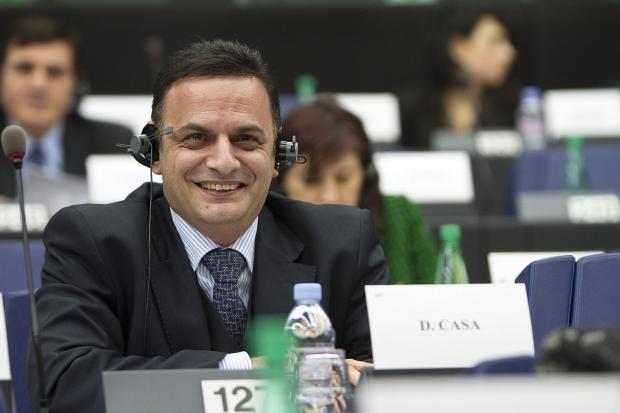It is the Malta Financial Services Authority, not the European Central Bank, which is the supervisory authority for licensing and compliance with banks registered in Malta, a spokesperson from the ECB has told The Malta Independent on Sunday, contrary to what Finance Minister Edward Scicluna told newsroom a few days ago.
Scicluna was approached with questions concerning the European Parliament's resolution calling on Maltese supervisory and judiciary authorities to investigate the licensing process of Pilatus Bank; however, he shrugged off questions, and insisted that the newsroom took its questions to the ECB Headquarters in Frankfurt.
"Banks are supervised by a banking union (ECB) in Frankfurt. Take Nemea Bank. The licence was withdrawn by the single supervisor in Frankfurt. Will you address the questions to them," he said.
The ECB spokesman said that while he was unable to comment on individual banks, he insisted that what he could say was that Pilatus bank certainly fell under the supervisory and regulatory powers of the MFSA, and not the ECB.
"The ECB only supervises and regulates the three largest banks in Malta," he said.
Unfortunately, the MFSA, the Minister, and the Parliamentary Secretary seemingly prefer to bury their heads in the sand on the issue raised regarding Pilatus Bank and Nexia BT, and seem to avoid the serious concerns of 466 MEPs across the entire political spectrum, some of whom are members of the Progressive Alliance of Socialists and Democrats, of which the Labour Party is a part.
The MFSA have so far refused to take regulatory action against Pilatus Bank, with a spokesperson telling the newsroom that "the Authority remains committed to protect the general interests of any current or prospective investors and the general public in terms of Law".
The spokesman also explained that the ECB will only begin investigating individual banks once an MEP files a direct request with the institution.

On 25 November, PN MEP David Casa called on the ECB's supervisory board to intervene in the case pointing to the numerous allegations and scandals surrounding the bank throughout 2017.
Pilatus Bank, he observed, was at the centre of controversy and scandal in the run-up to the 2017 elections: "The bank was the subject of extensive investigative reporting by journalist Daphne Caruana Galizia."
MEP David Casa stated at the time, "Leaked reports from Malta's Anti-Money Laundering Agency (the 'FIAU') revealed Pilatus Bank's clients to be, almost exclusively, Politically Exposed Persons from Azerbaijan. Bank accounts held by Pilatus Bank were also used to launder the proceeds from illegal kickbacks to the Maltese Prime Minister's Chief of Staff, Keith Schembri from the sale of Maltese passports.
"In another FIAU investigation it was revealed that payoffs by Keith Schembri to Adrian Hillman, the former Managing Director of The Times of Malta, were also laundered through Pilatus Bank accounts. In another case, Cheng Chen, an Accenture Strategy employee who negotiated on behalf of China's state-owned Shanghai Electric to buy Malta's power station and a large stake in Malta's state electricity company, Enemalta, was also revealed by Daphne Caruana Galizia's 'Panama Papers' reporting to have an offshore company with an account at Pilatus Bank. Extracts from another FIAU investigation report later revealed Chen Cheng expected to receive a €1 million payoff from the deal into his Pilatus Bank account," Casa stated in his statement.
"The evidence is overwhelming and in many cases conclusive. The anti-money laundering violations by the bank, as uncovered by the FIAU, are shown to be so extensive that they likely form the basis of the bank's business model. The fact that the evidence directly links the Office of the Prime Minister of Malta to Pilatus Bank suggests this money-laundering outfit will continue to operate within the European Union with impunity unless the ECB uses the legal powers it has at its disposal to intervene.
"Pilatus Bank also features extensively in the European Parliament's recent resolution on the rule of law in Malta. It is outrageous that this bank continues to hold a license to operate in the European Union. While I am fully aware that there is no precedent, I maintain that due to the gravity of the situation the ECB's Supervisory Board set up under the Single Supervisory Mechanism has a duty to intervene. I have requested the revocation of Pilatus Bank's license."

Casa said he is "informed that the ECB has received my letter as well as the relevant FIAU reports and that they have been circulated to the relevant units".
In a reply that day, the Labour Party said that Casa's actions were "an attempt to continue dirtying Malta's name by repeating allegations" and expressed dismay that he had failed to mention the action the ECB took against a local company "which had former PN Prime Minister Lawrence Gonzi as a director".
It was not made clear to this newspaper whether the ECB has begun to investigate or take measures with the bank.